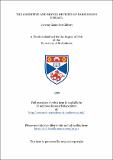Files in this item
The cognitive and motor deficits of Parkinson's disease.
Item metadata
| dc.contributor.author | Gauntlett-Gilbert, Jeremy | |
| dc.coverage.spatial | 278 p. | en_US |
| dc.date.accessioned | 2018-05-22T10:03:50Z | |
| dc.date.available | 2018-05-22T10:03:50Z | |
| dc.date.issued | 1999-03 | |
| dc.identifier.uri | https://hdl.handle.net/10023/13441 | |
| dc.description.abstract | Deficits of attentional and motor set that are seen in patients with PD were investigated in the research reported in this thesis. A deficit of attentional set is a failure of selective attention to one aspect of a complex stimulus. Deficits of motor set manifest as an inability to form a state of motor 'readiness' that can speed movement initiation. Attentional set was investigated with tasks that require patients to shift attention between perceptual dimensions (extradimensional - ED - shifting tasks), and motor set was studied using reaction time (RT) tasks. Study 1 rejected the hypothesis that the mechanism of 'learned irrelevance' causes ED shift deficits in patients with PD. Studies 2 and 3 confirmed that learned irrelevance also plays no role in determining the difficulty of ED shifts in healthy subjects. The experimental manipulation used in Study 4 succeeded in creating changes in scores that resembled those seen in patients with PD. Thus, it appears that patients with PD may have a deficit similar to that induced by the experimental manipulation - that is, an inability to attend to all dimensions present when hypothesis testing after an ED shift. A quantitative analysis of past RT studies of PD showed that the ability to speed movement initiation when given advance information about an upcoming movement - a form of motor set - is intact in patients with PD. In contrast, the motor set that underlies rapid simple RT performance is consistently dysfunctional in patients with PD. Study 5 investigated temporal and spatial motor set in PD, finding that these two mechanisms are functionally separate and that temporal motor set is intact in PD. A final study (Study 6) investigated the cognitive consequences of a novel neurosurgical treatment for PD, finding it to be largely a neuropsychologically 'safe' procedure. | en_US |
| dc.language.iso | en | en_US |
| dc.publisher | University of St Andrews | |
| dc.subject.lcc | RC382.G2G5 | |
| dc.subject.lcsh | Parkinson's disease | |
| dc.title | The cognitive and motor deficits of Parkinson's disease. | en_US |
| dc.type | Thesis | en_US |
| dc.type.qualificationlevel | Doctoral | en_US |
| dc.type.qualificationname | PhD Doctor of Philosophy | en_US |
| dc.publisher.institution | The University of St Andrews | en_US |
This item appears in the following Collection(s)
Items in the St Andrews Research Repository are protected by copyright, with all rights reserved, unless otherwise indicated.

